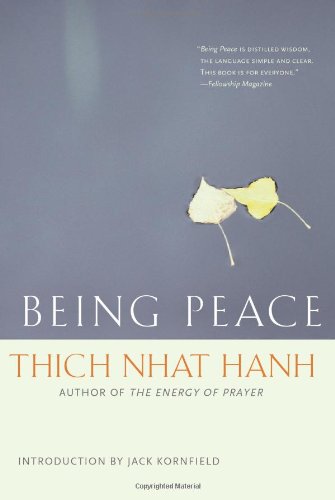Books |
Thich Nhat Hanh: Being Peace
By
Published: Jun 13, 2022
Category:
Spirituality
If we are not happy, if we are not peaceful, it follows that we cannot share peace and happiness with others, even those we love, those who live under the same roof. If we are peaceful, if we are happy, we can smile and blossom like a flower, and everyone in our family, our entire society, will benefit from our peace. Do we need to make a special effort to enjoy the beauty of the blue sky? Do we have to practice to be able to enjoy it? No, we just enjoy it.
I can hear the skeptical and cynical say: “This is Buddhism Lite.” True. But it is also Buddhism Essential. And it’s very useful for those of us who aren’t up to Ultimate Buddhism. (To buy the book from Amazon, click here. For the Kindle edition, click here.)
TNH delivers several messages here, and all of them are more practical than spiritual. Meditation, for example, is not a way to bliss out looking at a flower, it’s to become “aware of what is going on.” There is a section on the way monks resolve disputes that, if tried in government and business, might make for fast, fair solutions and reduced rancor. And then there are stories that illustrate his points, like this one, about the danger of what we like to call knowledge:
A young widower, who loved his five year old son very much, was away on business when bandits came who burned down the whole village and took his son away. When the man returned, he saw the ruins and panicked. He took the burnt corpse of an infant to be his son and cried uncontrollably. He organised a cremation ceremony, collected the ashes and put them in a beautiful little bag which he always kept with him.
Soon afterwards, his real son escaped from the bandits and found his way home. He arrived at his father’s new cottage at midnight and knocked at the door. The father, still grieving asked: “Who is it?” The child answered, it is me papa, open the door!” But in his agitated state of mind, convinced his son was dead, the father thought that some young boy was making fun of him. He shouted: “Go away” and continued to cry. After some time, the child left.
Father and son never saw each other again.
After this story, the Buddha said: “Sometime, somewhere, you take something to be the truth. If you cling to it so much, even when the truth comes in person and knocks on your door, you will not open it.”
This story speaks to me. All my life, I’ve been anxious and impatient. I think I understand what you’re saying before you finish saying it. I interrupt. I react too quickly. I sabotage myself. Recently, events have encouraged me — no, they’ve required me — to smarten up. I’m very much a work-in-progress, and this is only an interim report. And, yes, I’ve read “Being Peace” before. But this time what Thich Nhat Hanh has to say here seems personal to me: Be flexible. Pay attention. Breathe deep. Feel the day. Do all these things, he says, and you are on your way to “being peace” — and being effective, and feeling better, and all the rest of it.


